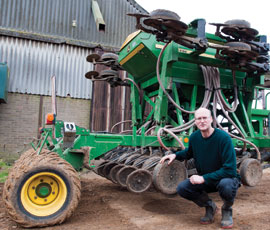Milling wheat producer co-op reaps unique supply deal

Andrew Bott is helping to create the enticing smell of baking bread in Sainsbury’s in-store bakeries that attracts shoppers towards the freshly baked loaves.
Together with a band of other specialist milling wheat producers, they are growing the entire in-store baking needs of Britain’s third-biggest supermarket chain.
This unique supply deal is in its sixth year and despite a rain-hit poor quality harvest in 2012, the growers are convinced they will be no need for a top-up of imported wheat.
With consumers scandalised by the horsemeat affair and the latest buzz words being traceability and the security of the supply chain, this deal could well be a pointer for farmers’ future relationships with supermarkets.
Mr Bott is one of 300 farmers, taken largely from the British bread basket of East Anglia, who are supplying 75,000t of top-quality wheat destined for in-store breadmaking.
All are members of the farmer-owned grain co-operative Camgrain which dries, cleans and grades the wheat to the milling specification Sainsbury’s needs.
“It’s definitely a plus point when I’m in Sainsbury’s to see that some of the freshly baked bread is coming from my wheat,” he says.
It’s been a struggle to meet the milling quality after such a wet harvest last summer, but with the help of Camgrain he can cut when the quality is high and leave the drying to the grain co-op.
This comes at a time when Premier Foods-owned Hovis abandoned its 100% British wheat pledge in January because of the poor harvest and will now import a third of its annual one million tonne needs.
Mr Bott, who farms 600ha in east Hertfordshire, picks up a health £30/t premium for his 500t plus of milling wheat pushing his return up to £220/t, which helps offset the extra costs and lower yields compared with growing feed wheat.
“I’d rather be producing something the market wants especially when the world is awash with feed wheat and I can still get a premium for milling wheat,” he adds.
Sainsbury’s mantra is based around creating a sustainable supply chain for a sustainable business and it is already well down this path with other products other than wheat, such as milk and chicken.
The supermarket group, which trails Tesco and Asda in market share, is keen to build up close farmer links as it looks to cut the carbon footprint across its overall supply chain.
“Our customers are telling us they want British wheat and of a high quality,” says Joann Reid of the supermarket’s product technology team.
So Canadian hard spring wheat was dropped from Sainsbury’s bread recipe in 2007, and Camgrain moved to supply all grain to the supermarket chain via specialist miller Whitworth Brothers.
Now all fresh bread sold in the supermarket’s 469 in-store bakeries and 487 smaller convenience stores comes from 100% British wheat and it remains committed to this pledge.
Despite the poor 2012 harvest, Camgrain has hit the milling specification of 13% protein, 250 Hagberg, and with the benefit of screening out shrivelled grain, a 76kg/hl specific weight.
It is able to pick the best 300 milling wheat producers out of its 520-plus members predominantly from East Anglia where there is less rain and more sunlight to produce top quality grain.
Farmer chairman of Camgrain John Latham says the relation with Sainsbury’s is strong and the retailer has encouraged growers by setting an undisclosed minimum premium for milling wheat over feed wheat.
The co-op’s overall business is growing annually at 10%-plus and the Sainsbury’s contract now accounts for less than 40% of its milling wheat throughput compared with 80% in 2007.
Camgrain’s overall annual wheat capacity has moved ahead of 200,000t with four sites open, two near to Cambridge, one at Kettering and another at Stratford-upon-Avon.
The grain operator capped its drying charges at £5/t this season even for grain leaving the farm at over 20% moisture which needs to be dried to 14% for safe storage.
“As a farmer, this means I can capture quality at harvest and not have to wait until the grain is below 18% before combining,” Mr Latham says.
Back in Hertfordshire, Mr Bott agrees and says he can cut his wheat when the quality is highest and never mind the moisture, which helps to secure his milling premium in difficult weather. We look at how he produces top quality milling wheat on p58.
